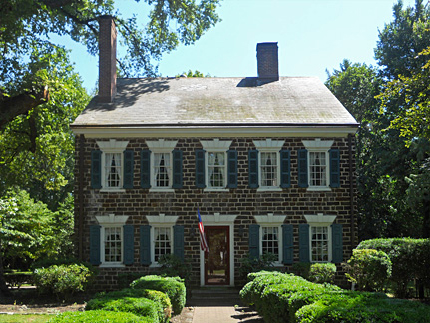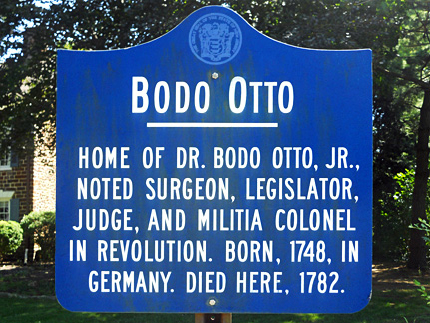



Bodo Otto, Jr. House
522 Kings Highway
Map / Directions to the Bodo Otto House
This house is a private residence.
Please respect the privacy and property of the owners.
This house was the home of Dr. Bodo Otto, Jr., who served as a surgeon and militia colonel in Colonel Read's Battalion in the Revolutionary War. He was born in 1748 in Germany. His family immigrated to Philadelphia in the 1750s.
Otto's father, Bodo Otto, Sr., who was also a doctor, served as a senior surgeon in the Revolutionary War. In 1777, Bodo Otto, Sr. ran a hospital in the Old Barracks in Trenton. In 1778, the elder Bodo was placed in charge of the hospital at Yellow Springs, where many of the sick soldiers from the Valley Forge, Pennsylvania encampment were treated. Bodo Jr. went to work at the hospital as well, and continued to work there until 1781. In 1778, while Otto Bodo, Jr. was at Yellow Springs, this house was burned and damaged by Loyalists, and subsequently rebuilt.
Dr. Bodo Otto, Jr., died on January 20, 1782, and is buried several miles from here in the Trinity Episcopal Church Cemetery in Swedesboro. [1]
Nicholas Collin, the Reverend at Trinity Church in Swedesboro, preached Otto's funeral sermon. Otto had been a friend of Collin, and he had once posted bail for Collin when he had been arrested by the militia for suspicion of being pro-British. In Collin's journal, he wrote of the type of person Otto was, including the remarkable fact that Otto helped get a pardon for one of the men who had burnt his house. Collin wrote: [2]
"[I] preached a funeral sermon for the Med. Doctor Bodo Otto in his house, a short mile from Raccoon [now Swedesboro], and buried him at the church... He was in all respects an honorable man, and he had so far as he was able to, prevented much evil during the war. Among praiseworthy actions he obtained pardon for one of the refugees, who had burnt down his house and who for this and other [crimes] would otherwise have been hung... A great crowd of people of all sects was gathered, for he was generally respected. His old father stood trembling at his beloved son's grave, weeping bitterly."
1. ^ Information in the first three paragraphs of this entry was drawn from several sources, including:
• State of New Jersey historic sign in front of the house
• William S. Stryker, Official Register of the Officers and Men of New Jersey in the Revolutionary War (Trenton: Wm. T. Nicholson & Co., 1872) pages 354 and 378 Available to be read at Google Books here• "The Bodo Otto House in Mickleton, New Jersey" Bulletin of the Gloucester County Historical Society, Volume 3, Number 7. (March, 1953) p. 25
• "A Challenge!" Bulletin of the Gloucester County Historical Society, Volume 3, Number 8. (June, 1953) p. 31
• "An Historic Note" Bulletin of the Gloucester County Historical Society, Volume 7, Number 8. (June, 1961) p. 29
▸ Copies of this newsletter (and of all newsletters that have been published by the Society since 1947) can be ordered from the Gloucester County Historical Society.2. ^ Information related to Reverend Nicholas Collin, and the quote from his journal were drawn from:
Nicholas Collin, Amandus Johnson, Journal and Biography of Nicholas Collin 1746 -1831 (Philadelphia: The New Jersey Society of Pennsylvania, 1936)
• Collin's account of his arrest, and Otto's posting the bail appear on pages 237-238
• The quoted text about Otto's funeral appears on page 259Note that when Collin refers to Otto's house being "a short mile" from Swedesboro, he is referring to a Swedish mile. A Swedish mile currently translates to 6.2 miles, but at the time it may have been a bit different. So his reference to a short Swedish mile likely refers to a distance a bit shorter than 6 miles. Otto's house is located four-and- a-half miles from the church.